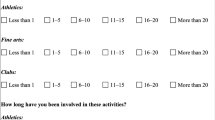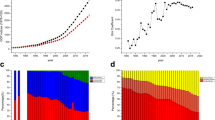Abstract
The study examines whether elementary school students in Taiwan who had received Montessori education achieved significantly higher scores on tests of language arts, math, and social studies than students who attended non-Montessori elementary programs. One hundred ninety six children in first, second, and third grade participated in the study. Children’s scores were measured by Elementary School Language Ability Achievement Test (ESLAAT), Elementary School Math Ability Achievement Test (ESMAAT), and Social Studies Ability Achievement Test (SSAAT). One-way multivariate analysis of variance (MANOVA) showed that students who had Montessori experience had a significantly higher score in language arts in all three grade levels. In math, first grade students scored higher but not second and third grade students. However, in social studies, students who had received Montessori education did not score significantly higher than the non-Montessori students. There was also no significant difference between the number of years spent in Montessori programs and students’ language arts, math, and social studies test scores in first, second, and third grade.
Résumé
Cette étude examine si des élèves taïwanais de l’école primaire qui ont reçu une formation montessorienne ont des résultats significativement supérieurs à des tests de langue, de mathématiques et de sciences sociales à ceux d’élèves de programmes primaires non montessorien. Cent quatre-vingt-seize enfants de première, deuxième et troisième années ont participé à cette étude. Les résultats des élèves ont été mesurés par l’Elementary School Language Ability Achievement Test (ESLAAT), l’Elementary School Math Ability Achievement Test (ESMAAT) et le Social Studies Ability Achievement Test (SSAAT). Une analyse de variance unidirectionnelle multi variée (MANOVA) montre que les élèves formés selon la méthode Montessori ont des résultats significativement supérieurs en langue aux trois niveaux scolaires. En mathématiques, les élèves de première année ont des résultats supérieurs, mais pas ceux de deuxième et troisième année. Cependant, en sciences sociales, les élèves formés selon la méthode Montessori n’ont pas de résultats significativement supérieurs à ceux des élèves non-Montessori. De plus, il n’y a pas de différence significative entre le nombre d’années en programme Montessori et les résultats des tests en langue, mathématiques et sciences sociales, en première, deuxième et troisième année.
Resumen
Este estudio examina si estudiantes de una escuela primaria en Taiwán, que habían sido educados en el método Montessori, lograban resultados significativamente más altos en exámenes de lenguaje, matemáticas y estudios sociales, en comparación con aquellos estudiantes qué venían de una educación primaria distinta del método Montessori. Participaron en el estudio ciento noventa y seis niños de primer, segundo y tercer grados. Los resultados de los niños fueron medidos por tres exámenes llamados ESLAAT (el cual mide la habilidad oral en niños de nivel primario), ESMAAT (el cual mide la habilidad matemática en niños de nivel primario), y SSAAT (el cual mide conocimientos en estudios sociales en niños de nivel primario). El análisis unidireccional de múltiples variables (MANOVA) demostró que los estudiantes con experiencia en el método Montessori obtuvieron resultados significativamente superiores en lenguas en los tres grados. En matemáticas, los estudiantes de primer grado obtuvieron resultados más altos, pero los estudiantes de segundo y tercer grado no. Sin embargo, en los estudios sociales, los estudiantes educados con el método Montessori no obtuvieron resultados significativamente más altos que los demás estudiantes educados sin este método. Tampoco se encontró ninguna diferencia significativa entre el número de años pasados en programas Montessori y los resultados de los estudiantes de primer, segundo y tercer grados en lenguas, matemáticas y estudios sociales.
Similar content being viewed by others
References
American Montessori Society. (2008). Montessori teachers make a difference. Retrieved from http://www.amshq.org/article_MakeDifference.htm.
Castellanos, A. G. (2002). A comparison of traditional vs. Montessori education in relation to children’s self-esteem, self-efficacy, and prosocial behavior. Dissertation Abstracts International, 63 (11), 5548. (UMI No. 3070508).
Chattin-McNichols, J. (2009). What does research say about Montessori? In M. H. Loeffler (Ed.), Montessori in contemporary American culture (pp. 69–100). Portsmouth: Heinemann.
Chen, S. (1991). Kindergarten curriculum study-Monte shuttle Lee taught school mode and single taught school in general mode of implementation card comparison. Unpublished Master Thesis, Taipei: National Taiwan Normal University.
Cheng, J. (1993). A comparative study of Montessori and unit-structured programs in Taiwan. Dissertation Abstracts International. 74(09). 3317. (UMI No. 9330810).
Cheng, J. (2008). Education in Taiwan. Taiwan: Ministry of Education.
Chien, C. (2007). Preschool curriculum model: Theoretical orientation and practical experience. Taipei: Psychological Publishing Company.
Chinese Montessori Foundation for Early Childhood Educational Research. (2008). Chinese Montessori foundation: Brief introduction. Retrieved from http://www.cfmontessori.org.tw/tw/Main.asp.
Chou, S. (2007). Kindergarten curriculum and teaching: On the orientation of the subject curriculum. Taipei: Psychological Publishing Company.
Chou, T., & Yeh, L. (2007). Elementary school language arts ability achievement test handbook. Taipei: Hsin-Hsing.
Davis, M. R. (2006). Montessori effects outlined in study. Education Week, 26, 13.
Dohrmann, K. R. (2003). Outcomes for students in a Montessori program. Retrieved from http://www.montessori-ami.org.
Dohrmann, K. R., Nishida, T., Gartner, A., Lipsky, D., & Grimm, K. (2007). High school outcomes for students in a public Montessori program. Journal of Research in Childhood Education, 22(5), 205–217.
Duax, T. (1999). Preliminary report on the educational effectiveness of a Montessori school in the public sector. The NAMTA Journal, 14, 56–62.
Duax, T. (2005). Report on academic achievement in a private Montessori school. The NAMTA Journal, 20, 145–147.
Epstein, P. (1990). Are public schools ready for Montessori? Principal, 69, 20–22.
Ho, H. (2006). The relation of preschool experience and first graders’ social adjustment. Unpublished Master Thesis, Taichung: Chaoyang University of Technology.
Hsu, H. (1995). China traditional and Montessori preschool education comparative study of mathematical ability. Tainan: Tainan Teachers College.
Huang, C. (1993). Comparison of Taiwanese Montessori and non-Montessori kindergarteners’ interpersonal skills. Unpublished Master Thesis, San Francisco: San Francisco State University.
Lillard, A. S. (2005). Montessori: The science behind the genius. New York: Oxford University Press.
Lillard, A., & Else-Quest, N. (2006). Evaluating Montessori education. Science, 313, 1893–1894.
Lopata, C., Wallace, N. V., & Finn, K. V. (2005). Comparison of academic achievement between Montessori and traditional education programs. Journal of Research in Childhood Education, 20(1), 5–13.
Manner, J. C. (1999). A comparison of academic achievement of Montessori and non-Montessori students in a public school setting. Dissertation Abstracts International, 60(09), 3271. (UMI No. 9946898).
Ministry of Education. (1987). The standards of kindergarten curriculum. Taipei: Ministry of Education.
Morrison, G. S. (2012). Early childhood education today (12th ed.). Upper Saddle River: Prentice-Hall.
Roopnarine, R., & Johnson, J. E. (2010). Approaches to early childhood education. Upper Saddle River: Pearson Ed. Inc.
Shen, W. (2005). To compare children’s mathematics ability who graduates from the common preschool and the Montessori school in Tainan city. Child Care Science, 11(6), 34–53.
Soundy, C. S. (2003). Portraits of exemplary Montessori practice for all literacy teachers. Early Childhood Education Journal, 31(3), 127–131.
Torrance, M., & Chattin-McNichols, J. (2009). Montessori education today. Upper Saddle River: Person Education Inc.
Tu, C. (2007). Education in Taiwan. Taiwan, Taipei. Retrieved from http://www.edu.tw/EDU_WEB/EDU_MGT/STATISTICS/EDU7220001/publish/education_ROC/education_ROC_2007.pdf?FILEID=159781&UNITID=139&CAPTION=Education in Taiwan.
Wei, M. (2007). Modern trend of thought in early childhood education. Taipei: Psychological Publishing Company.
Wu, M. (1994). Comparison of Montessori pre-primary and traditional kindergarten in Taiwan. Unpublished Master Thesis, Siena Heights College, Adrian.
Yeh, Y. (2007). Early care and education in Taiwan. Taipei: Psychological Publishing Company.
Yussen, S. R., Mathews, S., & Knight, J. W. (2008). Performance of Montessori and traditionally schooled nursery children on social cognitive tasks and memory problems. Contemporary Education Psychology, 5, 124–137.
Author information
Authors and Affiliations
Corresponding author
Rights and permissions
About this article
Cite this article
Peng, HH., Md-Yunus, S. Do Children in Montessori Schools Perform Better in the Achievement Test? A Taiwanese Perspective. IJEC 46, 299–311 (2014). https://doi.org/10.1007/s13158-014-0108-7
Published:
Issue Date:
DOI: https://doi.org/10.1007/s13158-014-0108-7




